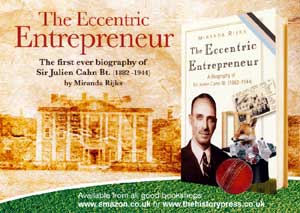Book launches and reviews, Autumn 2008
Miranda Rijks, The Eccentric Entrepreneur: A Biography of Sir Julien Cahn Bt. (1882-1944) (The History Press, 2008: price £20)
 |
Sir Julien Cahn was one of Nottingham's most successful inter-war businessmen. The son of a German-Jewish emigre, Albert Cahn, who moved to Nottingham in 1883, Julien worked briefly for Charles Foulds, the music chain, before joining the family firm, The Nottingham Furniture Company, at the age of 20. He turned this into a major national enterprise as Jays & Campbells, largely through the innovative development of hire purchase schemes, and in the process became immensely wealthy. He was not content to sit back and count his money, but he struggled to gain wider social acceptance in the anti-Semitic atmosphere of the time. To raise his personal profile he undertook numerous philanthropic works, and financed and ran the Julien Cahn XI, the most famous private cricket club in the world.
He was a Master of Foxhounds, though he was scared of jumping the fences; and his love of cricket was undermined by being frightened of the ball! He is still remembered locally for buying the historic parts of Newstead Abbey in 1931 and presenting them to Nottingham City Council, in order to preserve the name of Byron for evermore - although, in fact, he showed no interest in Byron otherwise. Miranda Rijks, who is Cahn's granddaughter, has written a richly entertaining book about one of the county's more interesting businessmen.
Ben Cowell, The Heritage Obsession: the Battle for England's Past (Tempus, 2008: ISBN 978 0 7524 4096 5)
For Thorotonians curious as to how we have come to live in a modern world which seems to be obsessed with heritage, this is a useful, and very well written guide. It traces the origins of the conservation movement, the views of the Victorians, and the role of groups such as the Society for the Protection of Ancient Buildings, Campaign to Protect Rural England, and the National Trust. It goes on to show how attitudes changed out of all recognition after 1945, with the arrival of listed building status, and subsequently country house visiting as a leisure pursuit, the formation in 1984 of English Heritage, the creation in the 1990s of the Heritage Lottery Fund, and the modern debates about conservation and preservation.
Ben Cowell gave the Thoroton Society's Nottinghamshire History Lecture in 1997, and he has subsequently worked both for the National Trust and English Heritage. He is now a senior civil servant in the Department for Culture, Media & Sport. Ben knows the ground, and in this volume he has written a careful and clear account of how conservation came to be a part of our way of life, and also asks some of the questions that we need to pose about the point of heritage, and what we are preserving and conserving for.